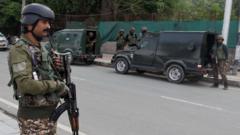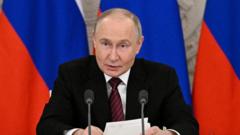The recent ceasefire between India and Pakistan marks a potential turning point in their long-standing tensions, as both countries claim victory after escalating hostilities.
Peace Prevails as India and Pakistan Celebrate Ceasefire After Skirmishes

Peace Prevails as India and Pakistan Celebrate Ceasefire After Skirmishes
In a significant diplomatic breakthrough, both nations assert triumph following U.S.-mediated truce.
As the ceasefire between India and Pakistan takes hold, both nations are declaring victory after a series of aggressive confrontations that prompted international intervention. President Donald Trump announced on Saturday the successful negotiation of a cease-fire, citing U.S. mediation efforts that halted a military clash involving drone strikes and heavy shelling.
In his address, Trump commended both sides for demonstrating the "strength, wisdom, and fortitude" necessary to avoid further loss of life. He also expressed intentions to significantly boost trade with both nations and work towards a peaceful resolution of the enduring Kashmir conflict that has troubled India-Pakistan relations for decades.
Pakistan, which has historically enjoyed a complicated relationship with the U.S., recognized Washington’s role in facilitating the ceasefire, suggesting a newfound diplomatic relevance. Meanwhile, the Indian government maintained a more cautious stance, emphasizing that the ceasefire was the result of direct negotiations between Indian and Pakistani officials, a sentiment reflecting India’s longstanding preference for bilateral discussions over third-party intervention.
As the situation develops, the world watches closely to see if this fragile truce can lead to lasting peace in a region marked by decades of tension.
In his address, Trump commended both sides for demonstrating the "strength, wisdom, and fortitude" necessary to avoid further loss of life. He also expressed intentions to significantly boost trade with both nations and work towards a peaceful resolution of the enduring Kashmir conflict that has troubled India-Pakistan relations for decades.
Pakistan, which has historically enjoyed a complicated relationship with the U.S., recognized Washington’s role in facilitating the ceasefire, suggesting a newfound diplomatic relevance. Meanwhile, the Indian government maintained a more cautious stance, emphasizing that the ceasefire was the result of direct negotiations between Indian and Pakistani officials, a sentiment reflecting India’s longstanding preference for bilateral discussions over third-party intervention.
As the situation develops, the world watches closely to see if this fragile truce can lead to lasting peace in a region marked by decades of tension.






















